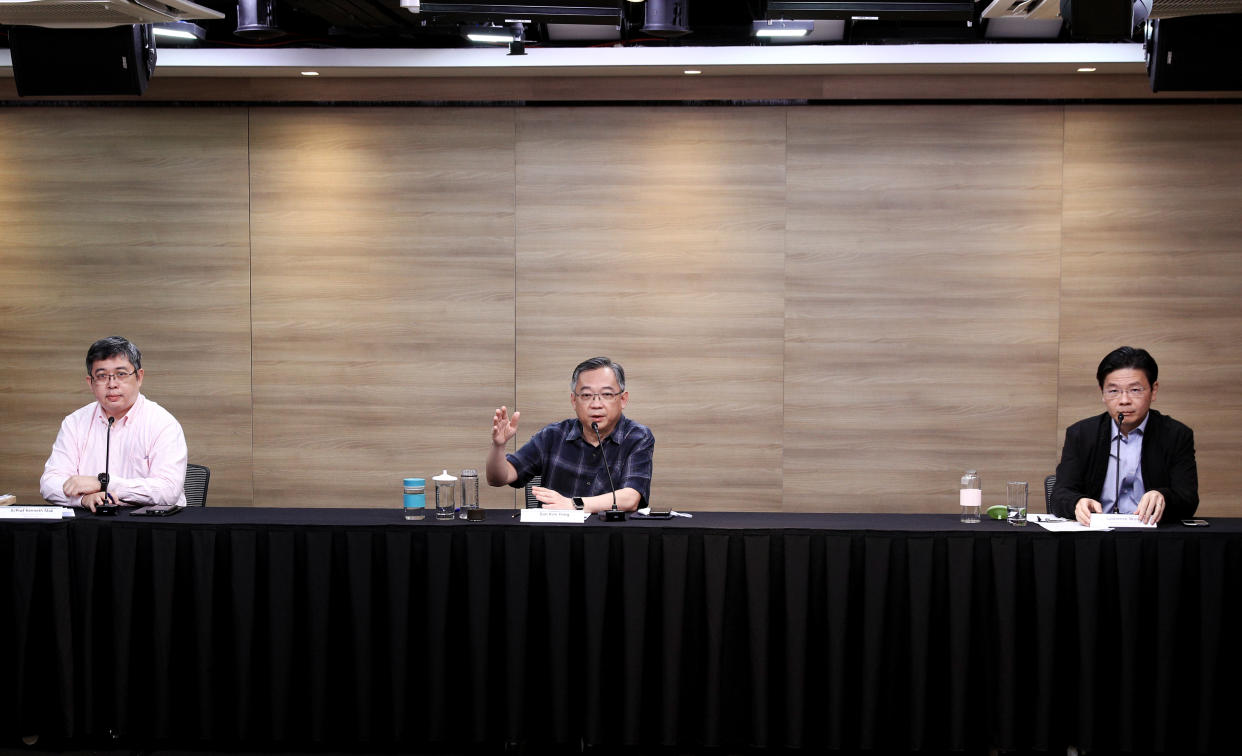COVID-19 taskforce urges vigilance as number of unlinked community cases rise

SINGAPORE — Nineteen days into Phase 2 of Singapore’s reopening, the multi-ministry taskforce tackling the pandemic on Tuesday (7 July) urged Singaporeans to remain vigilant and to be prepared for more COVID-19 cases with the resumption of more activities.
“What is of greater concern to us is the number of symptomatic unlinked cases that are detected in the community through routine screening for acute respiratory infection (ARI),” said taskforce co-chairman and health minister Gan Kim Yong on Tuesday.
“These are cases that emerge in the community with no clear connection to any existing cluster, dormitories, or construction sector. They reflect cases with unknown sources of infection. If this number goes up significantly, we should be very careful, as they may signal an increase in the underlying community transmission,” he said at a regular virtual press conference.
While the number of community cases is still low at about six to seven per cent of the total number of all cases, such cases have increased. Over the past week, there has been an average of 12 new community cases a day, up from around eight a day.
Among the community cases since the start of Phase 1, less than half (43 per cent) are unlinked. Of these unlinked cases, the majority are asymptomatic, and about half are workers in the construction and construction-related sectors, such as project-management. Two-thirds are likely to be past infections.
Gan emphasised that it has been slightly more than two weeks since Phase 2 began. “Economic activities and social interaction have increased significantly. Taking into account the virus incubation period, we should expect the number of community cases, especially those detected through enhanced ARI testing, to start to go up over the next few weeks,” he said.
“We must therefore remain vigilant. The taskforce has adopted a cautious and proactive stance. Once we see a possible cluster forming, we will move in quickly to impose precautionary measures to break the chain of transmission,” he added.
The health ministry on Tuesday said there were 20 new community cases, of whom 12 are Singaporeans/permanent residents and eight are work-pass holders.
“From our preliminary investigations, of these 20 cases, 12 were close contacts of earlier cases, and had already been placed on quarantine. Epidemiological investigations are ongoing for the other cases,” it said.
‘Majority of employees should work from home’
While the majority of linked cases in the community before the circuit breaker period were spread via social gatherings, the vast majority of linked cases in the community are now spread through households.
Given the nature of the virus, which spreads quickly among close contacts, this is not surprising, said taskforce co-chairman and national development minister Lawrence Wong.
“But what is interesting is also to see the patterns of transmission beyond the household. There are some infections taking place also in workplaces, and that is one area where all of us can do our part to reduce the risk of transmission further,” he said.
“Businesses, companies and employers all have to step up their safe management practices at work in order to further reduce the risk of transmission at workplaces. Making sure that the majority of the employees continue to work from home is one precaution that every employer should continue to take. Beyond that, for those who have to be in office, having split teams, making sure they do not gather together for social activities – these are important precautions that everyone, every employer, should continue to uphold,” he added.
On the low numbers of infections spread via social gatherings, Wong said this is partly due to the “very tight restrictions” on such activities.
“Many of us certainly would like to see these restrictions being relaxed over time so that we can engage in more activities. But if we want to do that, then all of us, again, need to be responsible, be vigilant, and do our part to avoid infections from picking up in these social settings,” he said.
He added, “And, if we want to be able to progressively relax some of these restrictions over time, we do need to step up to take responsibility for our actions, and to ensure that all of us do our part to minimise the spread of the virus.”
Follow Yahoo News Singapore’s GE2020 coverage here.
Stay in the know on-the-go: Join Yahoo Singapore's Telegram channel at http://t.me/YahooSingapore
General Election stories:
COMMENT: PAP should clarify on what it means by 'strong mandate'
GE2020: Building inclusive society a key challenge for Singapore – Tharman Shanmugaratnam
GE2020: Workers' Party is not 'pulling its punches' in spite of POFMA, says Pritam Singh
GE2020: Police investigating man believed to have made report on WP candidate Raeesah Khan
GE2020: 'Good friends' PSP's Tan Cheng Bock, SDP's Paul Tambyah reiterate call for COVID-19 debate



